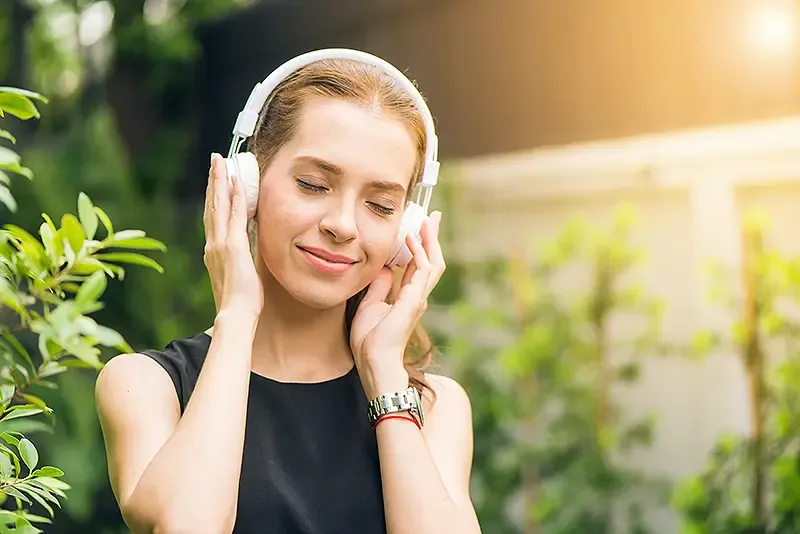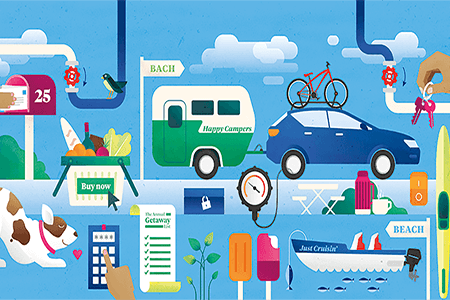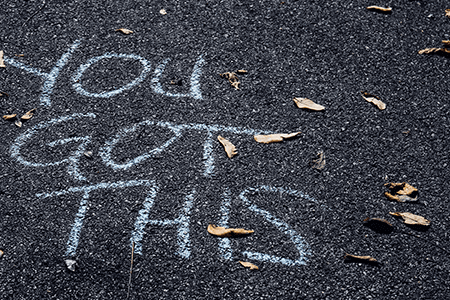Five ways to boost your mental health
By MAS Team | 18 September 2023
By MAS Team | 18 September 2023
You don’t need a major glow-up to make significant changes to your wellbeing, here are some simple and effective steps for Mental Health Awareness Week 2023 that are easy to incorporate into every day and their mood-boosting effects add up over time.
Let’s be real, modern life can throw us curveballs. They often come from all directions and all at once. From study pressures and money woes to that awkward situation with a friend or falling out with a flatmate. We all face hurdles that leave us feeling sub-par.
If you’ve ever felt down or had challenges with your mental health, you’re not alone. In a recent survey, we asked our student audience about the things they do regularly to look after their wellbeing, how they feel about their overall mental health, and whether they feel they have support available if they need it. Many of them said they were concerned about access to mental health services, worried about the stigma, or struggled to find the time for wellness between work and study schedules.
We know that taking care of our mental health is important, but sometimes even that can feel like it belongs in the ‘too hard’ basket.
This is where the power of simple habits and easy, everyday rituals comes into play. From taking a few minutes to enjoy a favourite song or spreading the feel-good factor by paying someone a compliment, brief moments of mindfulness can make a huge difference to our overall happiness.

Whether you identify better with the Te Whare Tapa Whā model of hauora or the Five Ways of this year’s Mental Health Awareness Week the idea is the same, taking regular small steps for wellbeing adds up to significant benefits for our taha hinengaro (mental and emotional health).
For Mental Health Awareness Week 2023 (September 18-24) the theme is Five Ways, Five Days and it’s about building up a toolkit of easy tips to support our mental wellbeing.
Whether you focus on one area a day, mix it up across the week or lean into whatever works for you in the moment, check out their suggestions:
This step is all about mindfulness. To be more mindful, try bringing your attention and awareness to what is happening at the present moment. You don’t have to be a meditation guru to reap the benefits; mindfulness can be as simple as engaging the senses. Focusing on what you can see, hear, touch, smell and taste can work wonders for calming racing thoughts and reducing stress.
Showing kindness to others not only makes the receiver feel good, it boosts the giver’s wellbeing too. In fact, regular acts of kindness, altruism or generosity have been proven to be a powerful way of enhancing life satisfaction and overall wellbeing. Whether it’s giving a sincere compliment or shouting someone a coffee, a little goes a long way when it comes to brightening someone’s day.

We know how being active is important for physical health, but it's also a powerful mood booster. From taking a walk outside to meeting a mate for a gym class, exercise relieves stress, boosts self esteem, and improves our ability to focus and concentrate. But the brain-enhancing benefits don’t end there - exercise triggers the release of feelgood chemicals, and it can also help to protect the health of our brain cells.
The Mental Health Foundation describes having meaningful connections with others as the ngākau (heart) of our wellbeing. It’s what weaves us together as people, and it’s vital for our sense of belonging and happiness.
Whether it's a quick chat with a neighbour or a catch-up with an old friend, connection comes in many ways, and every interaction is important for our overall health and wellness. We can boost connection by making time and effort with others, having conversations free of phones and distractions, and even by learning about the love languages that make us and other people feel appreciated.
The last of the 5 ways is all about trying new things. It might sound overly simple, but having a go at something new has a profound effect on our happiness, self esteem, and brain health. Learning a different skill enhances our ability to think by promoting new pathways in the brain, it expands our consciousness and view of the world, and increases self confidence. On top of that, it can also be a way to connect with others and make new friends.

Sharing our experiences, vulnerabilities, challenges and learnings with others helps to enhance our own health and support the people around us.
In a recent student survey, we asked them about the ways they monitor and look after their mental health. Their answers included treating themselves to a favourite food, making time for hobbies like painting or baking, catching up with friends and whānau, and making sure to get a quality night’s sleep.
For some of them, it was more about looking at the bigger picture: “I quite often check in with how I’m responding to the environment around me, and how I feel about my life in general. If something’s not aligning with how I see myself, then this usually means I need to step back and take time for myself.”
For others, it’s about connecting with tupuna (ancestors): “Being a student, there are days where I feel blessed to have such an opportunity, and others where I feel I want to give up. But I count my blessings and picture my family on my shoulder and my ancestors holding my back upright.”
We also asked them how financial security contributes to their mental health and how they nurture this. Many of them talked about the stress of covering bills, juggling part-time jobs with study, and keeping up with the high cost of living.
For some, using apps and budgets to keep tabs on finances was part of their wellness routine: “I keep track of my spending using separate bank accounts and also a spending app. This helps me to know where my money is going, and I try to 'stay in the green' (i.e. positive balance). This is a goal I can aim for every week, which helps my mental health.”
Lastly, we asked for their thoughts on what they think is missing in mental health support.
Their answers talked about barriers to accessing mental health care, like a lack of counsellors, delays in getting a diagnosis, financial barriers, and the need for more awareness around where to go for help.
They also felt there was still a significant stigma about mental health: “The stigma has to be removed. As openly as we can say ‘I have diabetes’, it has to be the same with depression. It needs to be looked upon as a normal symptom that can be treated. Every mental illness has some roots, if we stigmatise and make it a taboo subject, it will be difficult to bring healing and change.”
But they were also keen to be part of the solution: “There’s a shortage of therapists and psychologists, and that’s why I'm studying psychology.”
Regardless of how you look after your mental health, take some time to reflect on your own well-being and the well-being of those around you.
We have a guide of mental health resources and services you can contact if need.

9 March 2020
Great design can be found all over the city of Copenhagen, and the creativity of its people has long been a source of national pride. Read more on the art city here.

29 November 2018
It's that time of year where many of you will pack your car and head away for the summer break. Here are some tips for how to prepare for a happy, safe and stress-free holiday.

24 August 2020
In these times of uncertainty and change, many of us may feel an increase in our stress levels or anxiety. It's important to understand what works for you to boost your mental health. Here are some ideas to help you maintain healthy habits.